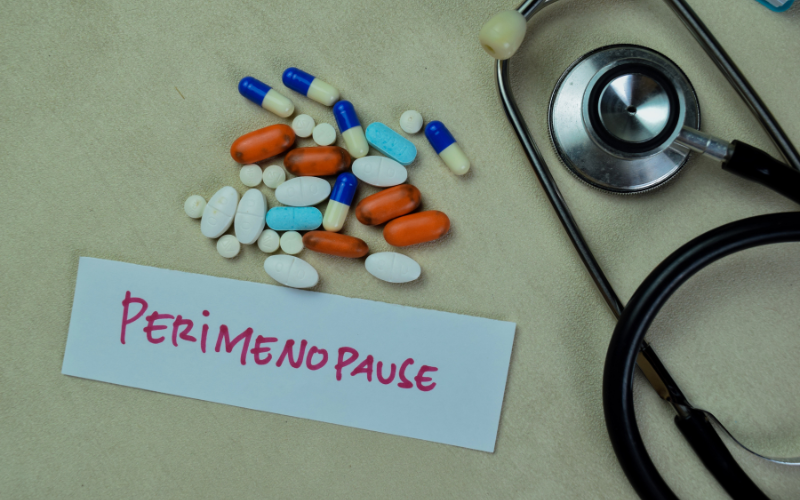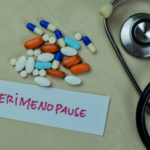
Perimenopause: Age, Stages, Symptoms & Treatment

Author: Dr. Suhasini Inamdar MBBS, MS (OBG)
Consultant - Obstetrician & Gynaecologist at Motherhood Hospital Indiranagar, Bangalore
What is Perimenopause?
Perimenopause occurs among women during the natural transition period before menopause, when the reproductive functions begin to wane – this is the time when the ovaries reduce the amount of estrogen produced and it lasts till the point when the ovaries stop producing eggs. It normally lasts from around 40 years of age to 55, but in some women it can even start in their mid to late 30s.
Perimenopause Symptoms
The level of estrogen is uneven during this time and the menstrual cycles become irregular. This means that bleeding could happen twice a month or happen once in two months, and there are cycles when the ovaries may not release an egg. The first sign for a woman who is approaching menopause is when the woman’s menstrual cycle is either infrequent or involves less bleeding.
The common problems during this period are hot flashes, which is a feeling of intense heat and sweating with rapid heartbeat and usually occurs during the night. Other symptoms are sleep problems, vaginal dryness and mood swings due to the changes in hormone levels. Low estrogen could also lead to frequent vaginal and urinary infections. It is also possible that due to poor tissue tone, she could experience incontinence. This could also lead to psychiatric problems. The bone density also decreases, increasing the risk of osteoporosis – which causes fragile bones. Women could also develop male balding patterns due to the increase in ratio of testosterone as compared to estrogen and this may also lead to them developing extra facial hair.
Lipid profiles also go haywire during this period and because of the reduced levels of estrogen, it could lead to an increase in LDL – bad cholesterol. Cardiac and cerebral strokes are also very common in perimenopause phase because of poor cholesterol levels. This period of perimenopause is expected to last around 5-10 years.
Perimenopuse Diagnosis
It is important for women to keep a track of their periods and the symptoms so that they can discuss it with their doctor. The doctor usually asks to do a test to make sure it is not a thyroid condition which also cases hormonal imbalance. The usual tests are Follicle Stimulating Hormone test. During menopause, the FSH levels increase and estrogen levels decrease. Prolactin levels are also tested to check if they are high, which signals approaching menopause. Anti Mullerian Hormone (AMH) is another test that shows the ovarian reserve and when that is low, it also means she is heading towards menopause.
The doctor also asks for certain blood tests and scans, to check the thickness of the endometrium. If the woman is not getting periods during perimenopause, the inner lining should not be very thick. If it is thick, they conduct other tests like hysteroscopy and D&C, pap-smear tests to rule out abnormalities like cervical cancer.
Perimenopuase Treatment and Management
Once menopause has been confirmed, the doctor may recommend medication and hormone replacement therapies to deal with the symptoms of perimenopause. The person may not necessarily need any treatment if the symptoms are not severe. But, there is a possibility that it may affect the quality of life – it is even possible for daily life to be affected if the symptoms are severe.
Doctors might recommend psychiatric help for women who are having a difficult time with mood swings and irritability. Women also need to follow some basic lifestyle changes in order to deal with symptoms. For hot flashes, it is recommended that they sleep in a cool and airy place. A change of place during the hot flash may help as will drinking cool water.
It is important to follow a good and nutritious diet and avoid fried food and sweets. The doctor will also recommend taking vitamins and supplements for getting the required nutrition. It is recommended they avoid or reduce intake of caffeine, alcohol and smoking as these increase the symptoms. Women can use lubricants to manage the problems of vaginal dryness.
Exercise is a very important part of managing symptoms. It keeps one healthy and delays the problems of aging. Maintaining a positive attitude also helps a lot towards addressing mood swings and mental issues. Perimenopause is a very natural part of life and much of the symptoms can be handled naturally by just following a good lifestyle rather than depending on medications.
Related Blogs

How to Treat and Prevent Brown Discharge
Read More
Endometriosis Understanding, Diagnosing, and Managing the Condition
Read More
Emotional Support During IVF Treatment
Read More
Understanding Gestational Diabetes: Insights from Dr Shruthi Kalagara
Read More
Urinary Tract Infection (UTI) in Pregnancy
Read More
Early Pregnancy Care for New Pregnant Women: Expert Advice | Motherhood Hospitals
Read More
Body Positivity Tips Post C Section (Cesarean Delivery)
Read More
Vaginoplasty: Procedure, Cost, Risks & Benefits, Recovery
Read More
The Digital Dilemma: Exploring the Medical Implications of Technology on Child Development
Read More
How To Relieve Menstrual Cramps? - 8 Simple Tips
Read MoreRequest A Call Back
Leave a Comment:
View Comments
Previous
Next
HELLO,
Stay update don our latest packages, offer, news, new launches, and more. Enter your email to subscribe to our news letter


 Toll Free Number
Toll Free Number








No comment yet, add your voice below!